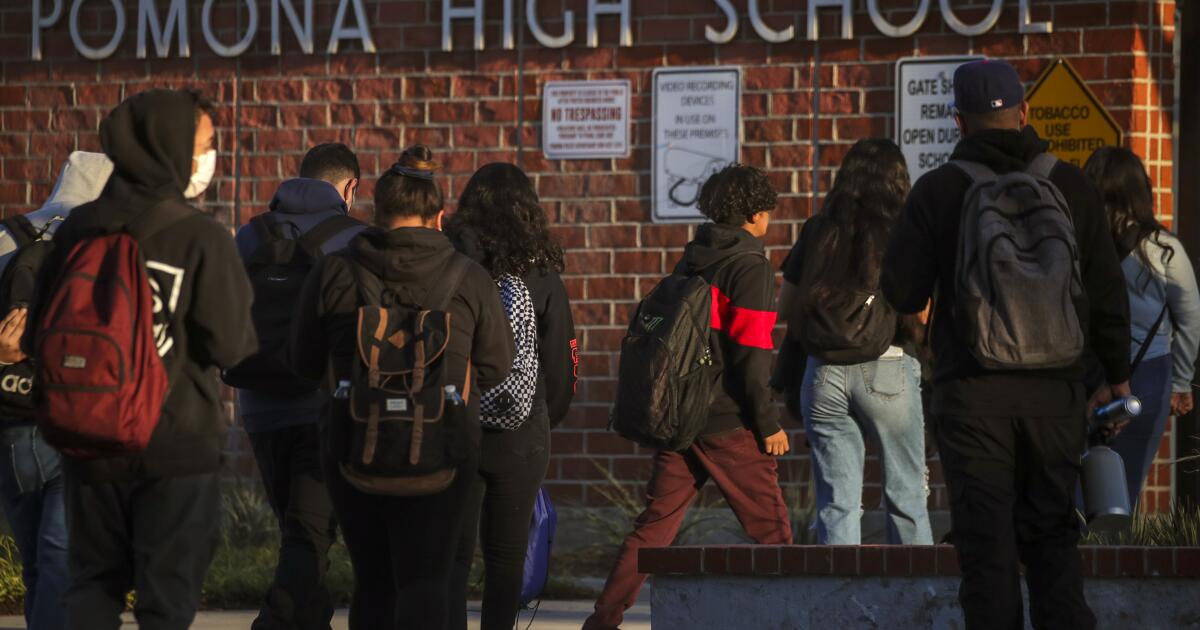The city of Pomona is the latest California municipality to offer some residents no-strings-attached cash in hopes of giving residents a much-needed financial cushion as they are still economically recovering from the COVID-19 pandemic.
The Pomona Household Universal Grant Pilot Program (Pomona HUG) will provide $500 per month for 18 months to 250 people. The funding comes with no strings attached and is intended to help families with young children who are struggling to pay rent, child care, and other expenses in cities in eastern Los Angeles County.
In Pomona, a city of about 146,000 people, roughly three-quarters of the residents are Latino and about 12% live below the poverty line.
“We’re hopeful that this grant will provide some immediate relief to families who are behind on their rent,” said Beverly Johnson, the city’s acting director of community services. “This $500 is meant to help ease their stress, but it can also be used in any area of need, so there are no restrictions on how the funds can be used.”
More than 200 guaranteed income experiments have been carried out across the country over the past four years in response to the pandemic, racial inequality and widening economic disparities.
Supporters tout unconditional cash transfers as a way to bring greater stability to vulnerable communities, and they say the programs can change perceptions of poverty by giving people more control over their own finances.
Critics of a related proposal, universal basic income, to provide cash benefits to all Americans have questioned the political feasibility of grants without work requirements and whether the funding would come at the expense of existing health and food programs.
Southern California has emerged as a leader in this movement: One of the largest experiments in the country, the City of Los Angeles’ Basic Income Guarantee: Los Angeles Economic Assistance Pilot (BIG:LEAP), provided $1,000 per month for a year to 3,200 residents who were pregnant or had at least one child, lived below the poverty level, and experienced COVID-19-related hardships.
Los Angeles County’s BREATHE guaranteed income program is one of the longest-running in the nation, providing monthly payments of $1,000 for three years to 1,000 residents in low-income and working-class neighborhoods negatively affected by the pandemic.
There are also more targeted efforts in Southern California, including a state-funded guaranteed income program that prioritizes former foster children and pregnant women, and a program for homeless people in Los Angeles.
Judith Perrigo, an assistant professor in the Department of Social Work at the UCLA Luskin School of Public Policy, said these programs could address immediate economic hardship, reduce economic inequality, and improve health outcomes and overall well-being. The experiments are also being rigorously studied, and researchers aim to provide scientific evidence to policymakers considering incorporating direct cash transfers into Social Security programs.
“As researchers, we want to know who is best able to do this,” said Perrigo, who has studied both the Los Angeles County and Pomona programs. “The truth is, as researchers, we don’t know the answer yet, but we’re all interested and would like to know.”
Shawn Klein, former director of Stanford University’s Basic Income Institute and now an international adviser to the behavioral science group ideas42, said researchers are trying to determine what the most effective amount of cash would be, and for how long it should be provided.
As part of the Pomona Project, which is funded by the federal government’s American Rescue Plan, the researchers plan to compare the experiences of the group receiving the unconditional cash with those of 350 additional participants who will receive a $20 stipend for 18 months. They are also interested in observing participants in their homes, observing how parents and guardians interact with their young children, and will conduct interviews and surveys.
UCLA’s Perrigo said the goal of the study is to learn more about how extra cash, or the lack thereof, affects the economic stability and well-being of families with children under the age of 4, as well as food security, parenting and early childhood development.
“We know that the brain develops rapidly in the first few years,” she says, “so just thinking about the opportunities that kids at that age can have — the investment they can get, the time that parents can gain by spending more time with their kids — it’s tremendous.”
Klein called the Pomona experiment a “bold move” that could provide policymakers and the public with further evidence about the effectiveness of unconditional cash transfers.
“More work is really going to be needed to challenge the harmful, often racial and gendered narrative that America has about poverty,” he said. “The more pilots we have, the more I think that narrative will reshape and create a more authentic and kind of accepting idea that families know best when it comes to figuring out how to survive and thrive.”
To be eligible for Pomona HUG, participants must be city residents at the time of application, be 18 years of age or older, pregnant or a parent or legal guardian of a child under age 4, and consent to participating in a UCLA research study. Participants must meet low-income criteria or have experienced job loss or increased housing or food insecurity due to the COVID-19 pandemic.
Applications for the pilot program will be accepted until July 8, with participants selected by lottery. The first payments are expected to be paid out via reloadable debit cards by August 26.
This story is part of The Times’ Equity Reporting Initiative, funded by the James Irvine Foundation, which examines the challenges facing low-income workers and efforts to address economic disparities in California.

